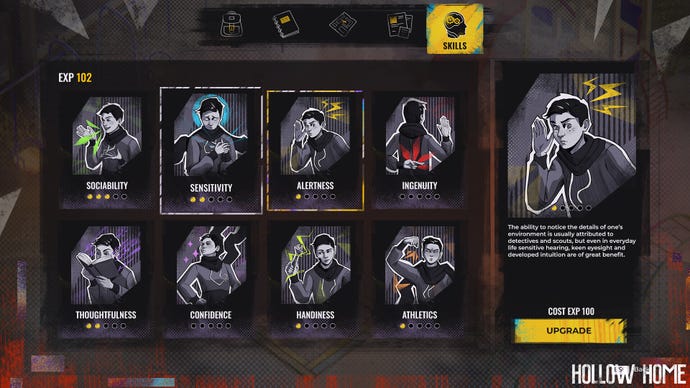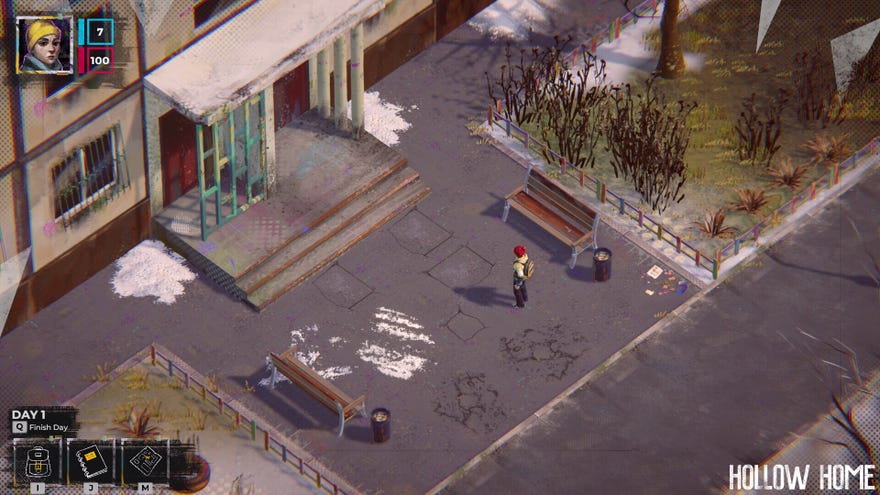Disco Elysium-inspired RPG Hollow Home is a memory of Mariupol from before Russia's invasion
"We want to tell the story of the people, and how the city has changed."
The Ukrainian city of Mariupol came under heavy bombardment during the opening months of Russia's invasion in 2022, a programme of artillery and air strikes that damaged or destroyed the majority of residential buildings and has killed or dispossessed thousands of people. It has now been occupied by Russia for almost two years, during which, as reported by the Associated Press, Russia has demolished, rebuilt and renamed much of the city, overwriting its Ukrainian heritage.
The Disco Elysium-inspired RPG Hollow Home is a memory of Mariupol from just before the war - not a 1:1 recreation, but a collection of details, colours, personalities and some familiar buildings, painstakingly amassed and offered up in the face of erasure. Speaking to me during a very brief demo at Digital Dragons in Poland this year, artist Anastasia Hlyniana called my attention to the plants jutting from old car tyres around the game's isometric map, which she says are a common sight in Mariupol.
Hollow Home began development in 2022, just after Mariupol's occupation, and is partly based on journalistic coverage of the invasion, though its characters and story are fictional. It unfolds over 30 in-game days, beginning shortly before Russia's vicious attack, and casts you as 14-year-old Maksym, who must survive and help others to survive. There's no combat in Hollow Home, and apparently, no direct or "graphic" representation of violence. Instead, the game explores the impact of the war on civilians, and the decline of individual neighbourhoods as residents are killed or flee the city.
Hollow Home's pen-and-paper-style role-playing and splashy, graphic novel colours are immediately reminiscent of ZA/UM's game, but the English writing is relatively straight-laced and reverential, as you might expect given that the devastation of Mariupol is both a lived reality and still unfolding. "It's our perspective on what happened, and also we want to tell the story of the people, and how the city has changed," Hlyniana summarised.

Maksym gets a limited supply of action points each day, which you'll use to perform skills such as cooking and first aid, based on character traits such as Sociability and Handiness. During the opening, pre-war section of the game, however, these points are reserved for more innocent activities: clambering onto a roof to fix a satellite dish, telling fibs about why you're ditching school, beating your friend's high score at the arcade, and trying to chase away a bullying older boy. In the course of these teenage antics, you'll meet and map out a community of shopkeepers, car mechanics, nosy neighbours and local layabouts, all speculating about reports of troops massing on the border.
"Some places will be destroyed, some new places will arrive, like shelters, volunteer centres," Hlyniana explained. "Some people will die, some new people will come, and the game has several endings. We aim to have about 24 hours of gameplay, and it will contain about three districts of the city, so it will be one big, typical Ukrainian city."
At the risk of centring my own responses as somebody whose country is not currently under assault, it felt strange to hear the situation in Mariupol outlined in terms of video game reviewer preoccupations like playlength and choice of endings. Sadly, my language skills were not up to the task of asking Hlyniana how the developers feel about positioning this memorial work as a commercial product on Steam, where it must frame itself for consumption alongside RPGs for whom an apocalyptic setting is an escapist fantasy. Hollow Home is due for release in 2025.

